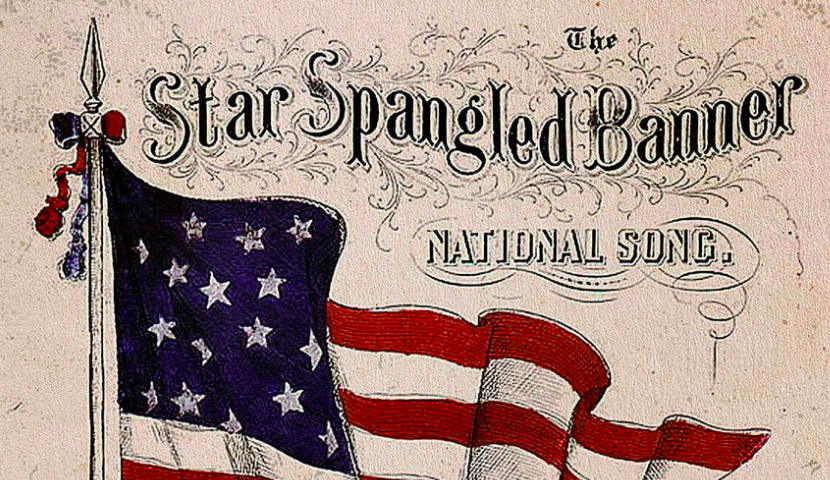That Our Flag Was Still There: Why our Principal Ordered off our National Anthem and What it Means
February 3, 2020
On Wednesday, December 18th, 2019, the House of Representatives impeached Donald Trump in response to his attempted extortion of Ukraine and defiance of congressional subpoenas. On Thursday, December 19th, 2019, I played the Star-Spangled Banner over the loudspeaker to celebrate this exercise of the checks and balances of our constitution and in an attempt to provoke a discussion about this massively significant national event. In order to be explicit about my purpose for playing the song, I prefaced it with the words, “Yesterday, the US House of Representatives voted to impeach Donald Trump.” Mrs. Kevgas, Radnor High School’s principal, ordered our national anthem turned off and removed me from my position choosing the morning music.
There is a critical opportunity for reflection here–not to complain about the consequence I suffered, for I have lost a privilege, not a right. We, however, may have lost something bigger. Not really because of this, but because of what this represents.
This was not the first time that I played music of which Mrs. Kevgas did not approve. I was one of two people appointed by the class president to play a song over the loudspeaker every morning before classes begin, a Radnor High School tradition. I took this responsibility because I had long wanted to use the platform to play songs that were politically, philosophically, or culturally meaningful.
At the beginning of the year, the only instruction that I was given was not to play any profane songs. Throughout the fall, I played numerous political songs and the administration never objected.
In December, I played Jesus Christ by Woody Guthrie, a non-religious song that discusses Jesus as a left-leaning economic commentary (“When Jesus come to town, all the working folks around/Believed what he did say/The bankers and the preachers, they nailed Him on the cross/And they laid Jesus Christ in his grave”). The song was turned off at Mrs. Kevgas’s direction, but I was not given any instructions not to play religious music (or any other instructions). Later that month, I played Rebel Jesus by Jackson Browne, another song that discusses Jesus secularly as an economic and social commentary (And perhaps we give a little to the poor/If the generosity should seize us/But if any one of us should interfere/In the business of why there are poor/They get the same as the rebel Jesus). That day, Mrs. Kevgas approached me and told me not to play any religious songs. I respectfully explained that Rebel Jesus was not a religious song (I am, in fact, a staunch atheist), citing the fact that it does not explicitly or implicitly suggest that god exists. The conversation continued for several minutes, and Mrs. Kevgas eventually told me that I was prohibited from playing any songs mentioning Jesus, and I agreed without further argument.
About a week later, on the Thursday before Christmas break, I played our National Anthem. It was turned off mid-song by Mrs. Kevgas’s order. Later that day, I was called into Mrs. Kevgas’s office. Despite the fact that I had not ever violated any of her directions concerning the morning music, she politely told me that I would no longer play the music, saying that “the morning music is supposed to be a fun tradition” and that “there is a time and place for the star spangled banner” (quotes are from memory and may be approximate). Given that selecting students to play the music is her prerogative, I cooperated fully and did not argue. That Friday, there was no music.
Mrs. Kevgas exercised her legitimate authority in dismissing me. This wasn’t about whether Mrs. Kevgas stifled political speech–she didn’t; this was about whether she would go out onto a limb to protect it (she received student complaints about the songs that mentioned Jesus, so continuing to promote my speech might have involved personal risk)–she didn’t do this either. She did her job and nothing more.
Now this is about all of us. While I’d encourage the students who play the music now to show similar audacity, the morning music is only a tiny part of a much more important question: what we, as Americans, think of political speech and discussion: not whether we’ll allow it (though this is coming under threat from parts of the right and left alike), but whether we venerate it.
I say that we should venerate speech and discussion. I say that the Star-Spangled Banner should have provided an opportunity for a discussion about the state of our nation, even at 8:25 on a groggy Thursday morning. I say that, now more than ever, it is essential that we meet this new world that technology, Trump, and a menagerie of other factors have brought us with reasoned discussion and audacious speech. I say these things as someone who understands the paramount importance of intellectual inquiry and expression to societal progress. I say these things as a citizen of the West who understands how apathy threatens liberal society as much as censorship. Above all, I say these things as an American who believes that the greatness that this republic is uniquely capable of achieving depends totally upon a commitment, through risks far greater than losing the privilege of playing morning music, to the noble ideals that our name demands.








ed trevisani • Feb 3, 2020 at 10:21 am
I volunteer for youth organizations (middle and high school age groups) and find that our youth knows very little about the founding or of country or its structure — e.g. when asked what form of government we have — virtually reply with “I do not know” or “we are a democracy”. We are a democratic republic and our founders had great reasons for this. Removing the National Anthem is just another example of NOT teaching our youth about the greatness of the US. Our schools do a poor job at educating the next generations about the uniqueness and greatness of our country. Our Principal should not only allow the National Anthem to be played on the loudspeaker but both Middle and High School students should be required/asked to recite the pledge of allegiance every day (like when I was growing up). It is a sign of respect for our country and our flag and all Americans should be proud of it– if they do not like something — SHOW UP AND GO VOTE!!!